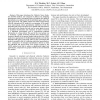Free Online Productivity Tools
i2Speak
i2Symbol
i2OCR
iTex2Img
iWeb2Print
iWeb2Shot
i2Type
iPdf2Split
iPdf2Merge
i2Bopomofo
i2Arabic
i2Style
i2Image
i2PDF
iLatex2Rtf
Sci2ools
CEC
2007
IEEE
2007
IEEE
Emergent specialization in the extended multi-rover problem
Abstract— This paper introduces the Collective Neuro Evolution (CONE) method, and compares its efficacy for designing specialization, with a conventional Neuro-Evolution (NE) method. Specialization was defined at both the individual agent, and at the agent group level. The CONE method was tested comparatively with the conventional NE method in an extension of the multirover task domain, where specialization exhibited at both the individual and group level is known to benefit task performance. In the multi-rover domain, the task was for many agents (rovers) to maximize the detection and evaluation of points of interest in a simulated environment, and to communicate gathered information to a base station. The goal of the rover group was to maximize a global evaluation function that measured performance (fitness) of the group. Results indicate that the CONE method was appropriate for facilitating specialization at both the individual and agent group levels, where as, the conventiona...
Related Content
| Added | 02 Jun 2010 |
| Updated | 02 Jun 2010 |
| Type | Conference |
| Year | 2007 |
| Where | CEC |
| Authors | Geoff S. Nitschke, Martijn C. Schut, A. E. Eiben |
Comments (0)

